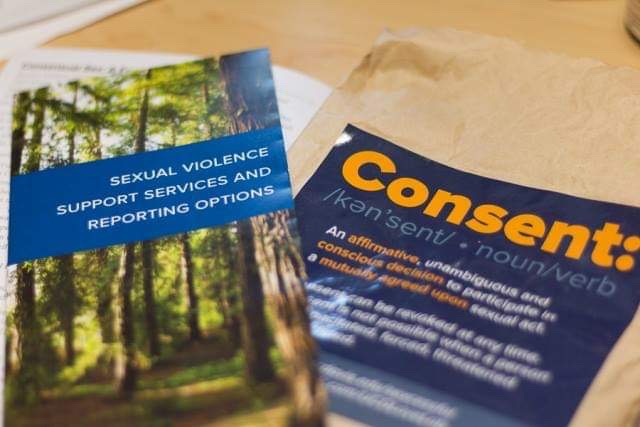Seven campus organizations come together to boost stories and voices of survivors
Nearly 30 events throughout the month of April will be held to educate students, raise awareness and honor survivors during Sexual Assault Awareness Month (SAAM). The events will take place almost every day throughout the month in hopes of getting different groups of students involved, including survivors of sexual assault, Chicanx and Latinx community members, the male student body, children and allies.
The Sexual Assault Awareness Advocacy Committee (SAAAC), the Cross Cultural Center (CCC), UC Davis Student Health and Counseling Services, the Women’s Resources and Research Center (WRRC), the Office of Sorority and Fraternity Life, the UC Davis LGBTQIA Resource Center and the Center for Advocacy, Resources and Education (CARE) are all working together to host different intersectional events throughout the month.
SAAM is an annual month-long tradition that works to spread awareness about the global epidemic of sexual assault and sexual violence, provide resources for survivors and educating community members. 20 to 25 percent of college women and 15 percent of college men will experience sexual assault or rape during their time at university, according to the National Sexual Violence Resource Center’s website. Of those impacted, more than 90 percent of victims will not report their assault.
Beyond their time as college students, 1 in 5 women and 1 in 71 men will experience sexual assault in their lifetimes. Members of the LGBTQIA+ community, racial minorities and other marginalized individuals also are more at risk of being victims of sexual violence than heterosexual, cisgender and white individuals.
Gursimran Kaur is a second-year, political science and sexuality and women’s studies double major and works as an outreach assistant at CARE. Kaur helped organize different events for SAAM.
“A lot of what I did to organize was communicate with people at different centers to make sure everything ran smoothly,” Kaur said.
This is the first time all seven centers on campus have collaborated on events during SAAM, working to incorporate each center’s focus and provide resources for the larger campus community.
Events include different crafting opportunities throughout the month to destress and participate in safe spaces, a workshop about healthy masculinity and male organizations (April 11), a consent for kids workshop (April 12), Denim Day information session and tabling (April 17 and April 23), Love Labs (April 4, 11, 18 and 25), Take Back the Night as well as others.
One of SAAM’s largest events hosted is Take Back the Night. Take Back the Night goes back to the 1960’s when women in Europe publicly protested not feeling safe walking alone at night. In 2001, the event came to America when Katie Koestner spoke out about the national issue of college “date rape” and the dangers women face walking around their own college campuses at night.
Take Back the Night aims to eliminate sexual assault, domestic violence, sexual abuse and other forms of dating violence, according to the event’s website. On April 10, students attended a workshop to help uplift the voices of survivors, create a space of solidarity and work toward empowering attendants to take back the night.
Allyanna Pittman, a UC-Davis alumna and education outreach specialist at CARE, worked with her team to organize this year’s Take Back the Night event.
“One of my biggest goals is really engaging the whole community and getting people to understand this is not just a survivor issue, this is not a women’s issue, everyone has a stake in this,” Pittman said. “I don’t want the burden of raising awareness and educating people and preventing this to be solely on survivors.”
Take Back the Night hosted different keynote speakers and empowered survivors to name their own experiences of sexual assault.
Other events throughout the month work to highlight the experiences of traditionally marginalized communities.
Anamaria Rizo, a third-year English and cognitive science double major, is chairperson of ASUCD’s SAAAC. Last year, Rizo, along with a coalition of other students, worked to organize an event that brought attention to sexual assault within Black and Brown communities. Inspired by the event, Rizo is helping facilitate a discussion-centered event this year that is organized around the subject of sexual violence in chicanx and latinx communities. The event was held on April 16 at the Center for Chicanx and Latinx Academic Student Success (CCLASS.)
“There are a lot of barriers that are culturally specific and contribute to the issues surrounding the perpetuation of rape culture, which is something we see universally,” Rizo said. “It’s extremely important to cater events pertaining to this topic towards specific communities because while sexual violence and sexual assault affect[s] all groups, individuals and identities, marginalized communities are often targeted. They experience sexual violence in higher numbers.”
All the events throughout the month aim to engage the larger campus community in education opportunities for allies, prevention efforts and safer spaces to empower survivors.
“No individual should ever have to feel alone through their experience,” Rizo said. “Providing allyship and support to ensure that no one ever feels silenced, unheard or blamed for their experience is always the goal and why we want to promote SAAM.”
Written by: Ally Russell –– campus@theaggie.org










It would be nice if we didn’t have so many organizations pursuing the same things. What an incredible waste of money. And 30 events? Really? Do you really think the 30th event is going to enlighten people in a way that the first 29 failed to? Just absurd.